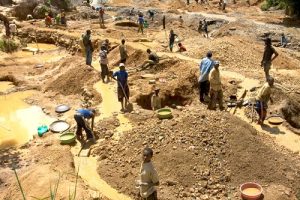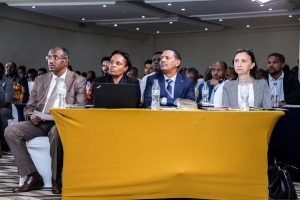
In the mid-1980s Ethiopia faced one of the worst levels of drought in history which left thousands of people and cattle dead. To add soar to the wound the plight of farmers and pastoralists doesn’t with the end of the drought season. It’s after is still worse as farmers have already lost their seeds and variety of cattle to resume their usual business.
The work of a renowned agriculture scholar stepped to the rescue of farmers who have made it to the season after drought. The gene bank he established has enabled him to supply the farmers with seeds of crops and cattle so that they can continue their good old life.
Laureate Melaku Werede (PhD) was an environmentalist and a prominent figure in the country’s conservation efforts. Born in 936 in Amhara State Melaku joined the Alemaya Agricultural College (Now Haramaya University) where he graduated with high grades and was retained to teach at the College.
He then continued his studies in genetics and breeding in Sweden. He served as a Dean of the Agricultural College at Jimma located in South Western Ethiopia and later joined the University of Nebraska in the USA where he obtained PhD in Genetics and Breeding.
Upon returning home, Melaku began working as a lecturer at Addis Ababa University and focused his research on the ecology and conservation of Ethiopia’s natural resources. His predecessor was a Director of PGRC/E. Founder and Director of the technical at Ethic-Organic Seed Action (EOSA), Regassa Feysa, told about him, after returning from the USA, Malaku established the Plant Genetic Resources Center of Ethiopia (PGRC/E) in 1979 making it one of the best gene banks in the world.
He started his career as a genetic resource scientist at a time when the global concern regarding the erosion of genetic diversity due to monocropping in the centres of crop genetic diversity gained momentum. Ethiopia was the centre of diversity for various crops, saving the diversity before it was displaced was the challenging task that Melaku confronted, he added.
Melaku and his colleagues at the centre were able to conduct intensive exploration and collection of diversity soliciting financial and technical support from concerned bodies such as FAO. This enabled capturing a wide range of genetic diversity that was conserved and also channelled to the National crop research.
As he retired in 1993, Melaku cofounded a program known as the Seeds of Survival that trained over 170 experts and technicians for genetic resource programs in Africa, South East Asia and in Latin America. Many agricultural officers, extension agents, farmers and policymakers were also trained at the national level, he remarked.
Throughout his career, Melaku was a passionate advocate for the preservation of Ethiopia’s natural resources and was instrumental in the establishment of several conservation initiatives in the country. He served as the director of the Ethiopian Wildlife Conservation Organization and was a founding member of the Ethiopian Environmental Protection Authority.
His greatest achievement is his success in establishing one of the best crop gene banking systems that integrated both on-farm and off-arm practices of conserving diversity. The system connected scientists to farmers and provided space for farmers’ traditional practices and knowledge in crop variety development.
The system has been the foundation for joint practices of farmers and breeders in developing crop varieties through Participatory Variety Selection (PVS). The practice to date is widely applied and is promoted by his predecessors and followers for distributing diversity in its competitive forms, which Melaku refers to as conservation through use.
Melaku is always remembered as one of the rare scientists who recognize farmers’ contributions and roles in conserving, developing and enhancing crop genetic diversity. Melaku was a pioneer to raise the concept of Farmers’ Rights to a global level in the 1980s. He fought for farmers to save their seeds as a strategy to counter Intellectual Property Rights (IPRs). It was over 20 years later that Farmers Rights became one of the FAOs agenda which at present is enshrined into the FAO’s International Treaty on Plant Genetic Resources for Food and Agriculture (ITPGRFA).
He said about him, the impact of the plant genetic resources program led by the Center was manifested during the 1984 drought that decimated thousands of lives stock and crop genetic diversity in the Northern part of the country. The Center’s gene bank reintroduced the lost diversity to farms and supported farmers to restart their lives. It was at this moment that the concept of a community seed banking system came to light. The community seed banks at present are connected to the National gene bank to support the continuous flow of diversity between farmers and the national gene bank through different programs.
He also further stated that the program of the Center trained quite a big number of agricultural officers, extension agents and policymakers at the national level to bring back appreciation for diversity in the face of uncertainties. The program unlike many developing countries is attracting the national government and policies to invest in the conservation of the indigenous crop genetic resources.
The contributions of PGRC/E and the role it plays, in general, have brought attitudinal shifts at both agricultural development policy and strategy levels in the country with the Government’s full commitment to consistently finance the Centre’s activities and scaling out of experiences.
One of Melaku’s notable contributions to conservation in Ethiopia was his work on the development of community-based conservation initiatives. He recognized that conservation efforts needed to involve local communities, who were often the most impacted by environmental degradation and had the most knowledge of the region’s natural resources. He worked with communities to establish conservation areas and develop sustainable livelihoods that were compatible with conservation goals.
Melaku was also a strong advocate for the protection of Ethiopia’s unique biodiversity, which includes many endemic species found nowhere else in the world. He worked to raise awareness of policymakers, the media, and the general public about the benefits of conservation and was a vocal critic of development projects that were harmful to the environment.
Melaku shared his views and experiences worldwide and served at different levels nationally, regionally and globally. He served as the first Chair Person of the African Committee on Plant Genetic Resources, as Chair of the FAO Commission on Plant Genetic Resources, as a Board Member of the International Plant Genetic Resources Institute (IPGRI) and in others nationally and globally. He was awarded the Right Livelihood Award in 1989 for preserving Ethiopia’s genetic wealth by establishing the best seed conservation Centre.
In addition to his work in Ethiopia, Melaku was also involved in several international conservation initiatives. He served as the vice-chair of the International Union for Conservation of Nature’s Species Survival Commission and was a member of the board of directors for the African Wildlife Foundation, indicated by research.
In recognition of his contributions to conservation, Melaku received numerous awards and honours, including the Order of the Star of Ethiopia from the Ethiopian government and the Rolex Award for Enterprise. He was also a member of several prestigious international organizations, including the World Conservation Union, the Society for Conservation Biology, and the International Association for Landscape Ecology. For instance, he was also awarded the Outstanding International Contribution Award in 2008 by the National Green Award Foundation of Ethiopia.
One of Melaku’s legacies to inspiring environmentalists and conservationists in Ethiopia and around the world was his unwavering dedication to the protection of Ethiopia’s natural resources and his innovative approaches to community-based conservation that had a lasting impact on the country’s conservation efforts and serve as a model for others working in the field.
Furthermore, Melaku is a scientist with deep knowledge and vision and a generous mentor who fully shares his thoughts, knowledge and experiences with his colleagues and followers. He is a person with a high level of integrity and humility, a model to many of his colleagues, students and followers. His contributions in advising, supporting and training several gene bank curators and many other young scientists and a number of his initiatives to support biodiversity conservation and utilization in Africa and other regions take the Ethiopian experience as their model and are attributable to ground-breaking works of Melaku.
Melaku passed away on 31 July 2023, leaving behind a legacy of environmental conservation and advocacy that continues to inspire others to this day. His contributions to the field of ecology and conservation have been recognized both in Ethiopia and internationally, and he remains a revered figure in the country’s environmental movement.
BY FIKADU BELAY
THE ETHIOPIAN HERALD WEDNESDAY 2 AUGUST 2023





